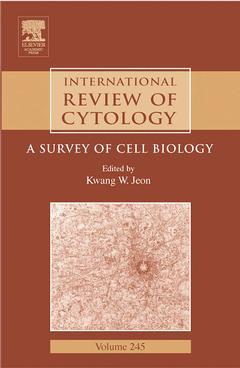Description
International Review of Cytology
A Survey of Cell Biology
Coordinator: Jeon Kwang W.
Language: English
Subject for International Review of Cytology:
Publication date: 09-2005
352 p. · 15x22.8 cm · Hardback
352 p. · 15x22.8 cm · Hardback
Description
/li>Contents
/li>Readership
/li>Biography
/li>
International Review of Cytology presents current advances and comprehensive reviews in cell biology ? both plant and animal. Authored by some of the foremost scientists in the field, each volume provides up-to-date information and directions for future research. Articles in this volume address Calpain proteases in cell adhesion and motility; Transforming growth factor beta (TGF-b) and programmed cell death in the vertebrate retina; Molecular Mechanism of Apoptosis Induced by Mechanical Forces; Cellular functions of ER chaperones Calreticulin, calnexin, and Erp57; Plasticity of nonapeptidergic neurosecretory cells in connection with the discovery of neurosecretion; Interactions between virus proteins and host cell membranes during viral life cycle; Nerve ending "signal" proteins GAP-43, MARCKS and BASP1.
Calpain proteases in cell adhesion and motility;
Transforming growth factor beta (TGF-b) and programmed cell death in the vertebrate retina;
Molecular Mechanism of Apoptosis Induced by Mechanical Forces;
Cellular functions of ER chaperones Calreticulin, calnexin, and Erp57;
Plasticity of nonapeptidergic neurosecretory cells in connection with the discovery of neurosecretion;
Interactions between virus proteins and host cell membranes during viral life cycle;
Nerve ending "signal" proteins GAP-43, MARCKS and BASP1
Transforming growth factor beta (TGF-b) and programmed cell death in the vertebrate retina;
Molecular Mechanism of Apoptosis Induced by Mechanical Forces;
Cellular functions of ER chaperones Calreticulin, calnexin, and Erp57;
Plasticity of nonapeptidergic neurosecretory cells in connection with the discovery of neurosecretion;
Interactions between virus proteins and host cell membranes during viral life cycle;
Nerve ending "signal" proteins GAP-43, MARCKS and BASP1
Cell biologists, molecular biologists, developmental biologists, physiologists (organ level), biomedical scientists, biochemists studying cell-cell interactions, cell variation and evolution.
Kwang Jeon received his Ph.D. in cell physiology at King’s College, University of London, UK, in 1964 and taught at SUNY Buffalo and University of Tennessee. His research was concerned with the biogenesis and function of cell components in two major areas: Integration of intracellular symbionts into host cells leading to the acquisition of new cell components and cell variation; Membrane-protein recycling during endo- and exocytosis.
© 2024 LAVOISIER S.A.S.
These books may interest you

Evolutionary Origin of Sensory and Neurosecretory Cell TypesVertebrate Cranial Placodes, volume 2 160.25 €

Cell DeathMechanism and Disease 157.74 €

Cell DeathMechanism and Disease 105.49 €

